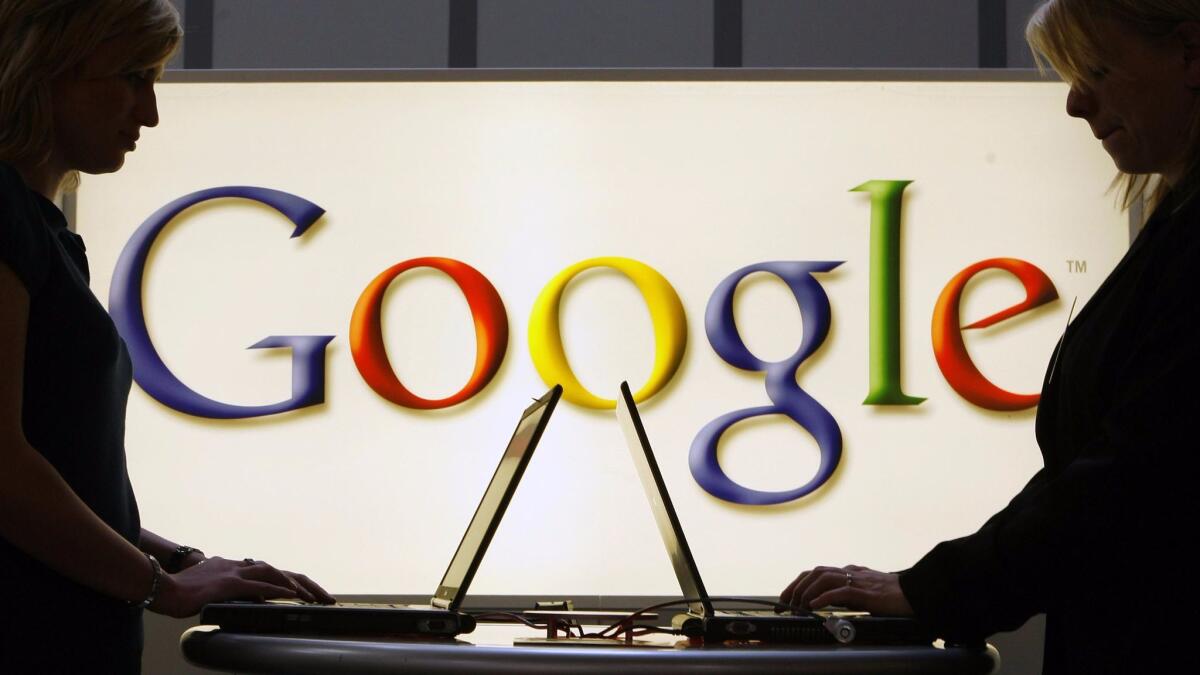Op-Ed: Has Google paid off an army of academic researchers?

- Share via
The Google Transparency Project, an arm of an organization called the Campaign for Accountability, released a study last week claiming that Google funneled money to hundreds of academic research projects related to antitrust, intellectual property and other legal policy issues important to the company’s bottom line. Worse, the Google Transparency Project alleged that most of the resulting publications failed to disclose Google’s financial stake in the research. Pitched as an exposé of corporate corruption of the ivory tower, the story got immediate traction in national and international media outlets.
The study comes at a time of justified public anxiety about the outsized power and influence of tech titans such as Google, Facebook and Amazon. Google overwhelmingly dominates the global market for online searches. Along with Facebook, it controls almost half of the world’s digital advertising market. Its Android operating system powers about 80% of the world’s smartphones. And its YouTube video-sharing platform boasts 1.5 billion monthly users.
Given Google’s size and power, it may be tempting to reflexively credit the Google Transparency Project’s allegation that the company has paid off a small army of academic researchers. The project has identified some troubling examples of undisclosed Google funding; however, its broader claim of a vast network of bought-and-sold academic researchers deserves careful scrutiny. In an environment in which academics already are seen by many as biased, the Google Transparency Project’s claims further undercut public confidence in academic expertise. If academic research is secretly funded and directed by large corporate interests — and Google is among the largest — why should the public and policy makers trust it?
Judged on these two criteria — disclosure and merit — the Google Transparency Project’s study fails miserably.
Corporate funding alone does not mean that research is unreliable. As federal and state dollars available for research continue to dwindle, more research is likely to be funded directly or indirectly by corporations, foundations and other private sources. When specific research projects rely on such funding, that relationship should, of course, be disclosed. But ultimately, regardless of whether research is privately funded, its results should be evaluated on the merits.
Judged on these two criteria — disclosure and merit — the Google Transparency Project’s study fails miserably.
For a project committed to transparency, this one is evasive about the sources of its funding. The organization has yet to tell the Internal Revenue Service where its money comes from, and its executive director has refused to answer repeated inquiries from journalists about who pays the Campaign for Accountability’s bills. To date, only one project funder has come forward. That benefactor, Oracle, is currently locked in a billion-dollar copyright fight over its Java programming language. Oracle’s opponent in that years-long legal battle? Google.
As for the study itself: It’s deeply flawed.
The Google Transparency Project’s methodology for identifying “Google-funded academics” was sloppy; it defined that category so loosely that it swept up researchers who have never actually received funding from Google.
The project’s dragnet captured scholars who were affiliated with but not actually paid by academic centers that have disclosed receipt of funds from Google. (Annemarie Bridy was named for that reason.) The project also deemed scholars “Google-funded” on the basis of nominal stipends they received as graduate students for summer work at public interest organizations. And once a scholar was “Google-funded,” all of his or her subsequent academic work, even work undertaken at a new institution, was tainted in the Google Transparency Project’s reckoning.
Another example: Over the years, courts have directed settlement funds from class-action suits against Google to law school clinics around the country. Any scholar who worked in one of these clinics was “Google-funded,” according to the project, as well as co-authors of such scholars. (Aaron Perzanowski fell into the funding-by-association category.)
In short, the financial connections to Google for many academics included in the Google Transparency Project’s database are tenuous at best and sometimes verifiably nonexistent. Dozens of scholars already have objected to the inaccurate inclusion of their work.
The report raises valid questions about the corporate funding of academic research. It should make all researchers consider their disclosure practices and their financial relationships. Ultimately, however, the Google Transparency Project’s efforts have generated more confusion than clarity. The body of data underlying the study is awash in misrepresentations and mistakes that the authors should have sorted out before publication. The study’s legitimacy is further undermined by the project’s adamant refusal to abide by any funding disclosure standard.
Most harmful, the Google Transparency Project’s targeting of academics contributes to a treacherous trend in public discourse that seeks to delegitimize the role of expertise in the policymaking process. The attacks on academics that we have grown to expect in the domain of climate science are now creeping into the contentious field of technology policy. Journalists who report on “studies” like the Google Transparency Project should think twice before simply repeating the authors’ conclusions. And the public should demand transparency from any organization that purports to be in the business of exposing the hidden agendas of others.
Annemarie Bridy is a professor of law at the University of Idaho. Aaron Perzanowski is a professor of law at Case Western Reserve University. Neither has received funding, directly or indirectly, from Google.
Follow the Opinion section on Twitter @latimesopinion or Facebook
More to Read
A cure for the common opinion
Get thought-provoking perspectives with our weekly newsletter.
You may occasionally receive promotional content from the Los Angeles Times.









